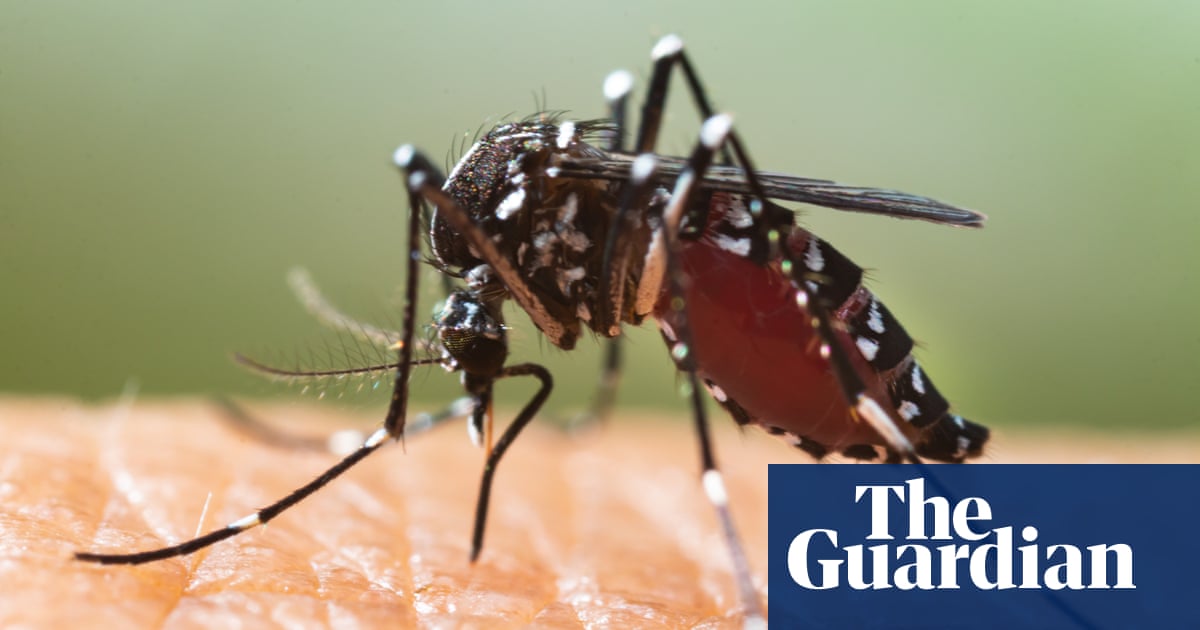
A report has warned that the climate crisis could lead to an additional 10,000 deaths in the UK annually by the 2050s due to severe heat and also bring about various tropical diseases.
According to a report released on Monday by the UK Health Security Agency (UKHSA), the most severe outcome would be a 4.3 degree Celsius increase in average temperatures, resulting in a projected twelvefold increase in deaths related to heat by 2070. The report also suggests that deaths could rise by 1.5 times in the 2030s.
The data is derived from the HECC report by UKHSA, which analyzes the impact of the climate emergency on health outcomes in Britain.
This statement suggests that illnesses spread by insects, including dengue fever and Zika virus, may potentially spread throughout the UK as a result of species from warmer regions entering the country.
The report predicts that by the 2040s and 2050s, the Asian tiger mosquito, known for transmitting diseases like dengue, Zika, and chikungunya, may become prevalent in most of England. It also suggests that areas such as Wales, Northern Ireland, and parts of the Scottish Lowlands could become suitable habitats for the mosquito later in the century. In addition, the report states that London could see consistent dengue transmission by 2060.
Prof Isabel Oliver, the chief scientific officer at UKHSA, said: “This report starkly demonstrates the impact that climate change could have on our society if we do not take decisive action. We can expect major impacts on physical and mental health, while our changing climate will also exacerbate existing health inequalities.”
However, the UK Health Security Agency emphasizes that a majority of these forecasts are based on a worst-case scenario, and taking action against climate change could help mitigate many negative impacts on public health.
One way to achieve this goal is by changing our actions and taking steps to reduce the impact. These efforts could involve implementing national heat and cold warning systems and making improvements to buildings, such as using energy-saving techniques and installing flood protection measures.
Professor Oliver stated that in the UK, there are several potential negative effects on health that can still be prevented through mitigation efforts. Additionally, there are others that can be avoided by implementing necessary adaptation measures. As such, it is crucial that the findings presented in this report are utilized to inform policy decisions and initiate action.
The report also details steps that must be taken to reduce the future harm – including implementing solar power, energy-efficient lighting, and passive or low-carbon heating and cooling.
According to this statement, rising temperatures and a growing elderly population will result in a higher number of fatalities and health issues caused by extreme heat. Without adaptation, it is predicted that up to 10,000 deaths annually may occur due to extreme heat by the 2050s in a scenario with high levels of warming.
The current global objective to keep global warming below 1.5C is expected to be surpassed within the next 5-10 years, as the world is currently on course for a 2.7C increase in temperature.
According to the worst-case high-emissions scenario projected by UKHSA, there will be a temporary rise in cold-related deaths due to an aging and expanding population. However, this trend is expected to reverse by the middle of the century, with moderate cold-related deaths peaking before gradually decreasing by the 2070s.
In the year 2022, the highest number of recorded deaths in England were caused by high temperatures, totaling over 4,500. Among those deaths, there were over 2,800 individuals aged 65 and above who died during the heatwave. On July 19th and 20th of that year, temperatures reached a record-breaking 40C, resulting in a sudden increase in deaths with 638 and 496 fatalities respectively.
The report emphasizes that the most severe consequences of climate change will disproportionately impact marginalized and disadvantaged communities, potentially exacerbating existing health disparities.
after newsletter promotion
“The increasing ageing population in the UK will significantly contribute to the country’s vulnerability to climate change, particularly in terms of health, in the years to come. The impact of climate-related risks on health will align with existing disparities in health and inequality.”
Individuals who struggle to manage their surroundings, adjust their actions, or handle new dangers will be at a higher risk, especially children, individuals with disabilities, those without homes, and those in specific environments like prisons, schools, and social care facilities.
Dr. Lea Berrang Ford, the director of the UKHSA’s Centre for Climate and Health Security, stated that the effects of climate change will not affect everyone and every community equally.
According to her, the south of the country will likely be the first to experience risks associated with vector-borne diseases, as these risks are expected to enter Europe through that region.
Climate change is making existing health vulnerabilities worse, which affects communities and individuals who cannot afford or access cooling technologies, cooling centers, and other adaptation options. The impacts of climate change are not evenly distributed and can vary based on location, community, and individual.
According to the report, a high-emissions scenario could put more UK residents at risk of severe flooding, resulting in a significant negative impact on mental health. Those affected by flooding are more likely to experience depression, anxiety, and post-traumatic stress disorder.
According to a spokesperson for the government, the UK is at the forefront of addressing climate change by significantly reducing emissions compared to other major economies. Currently, the UK only contributes to 1% of global emissions.
“The program involves implementing strategies to enhance the resilience of healthcare systems in the face of climate change. This includes collaborating with the healthcare and social service sectors to better address the impacts of extreme weather events.”
Source: theguardian.com
















